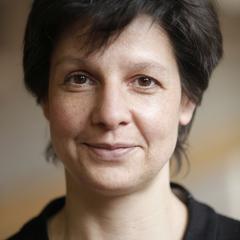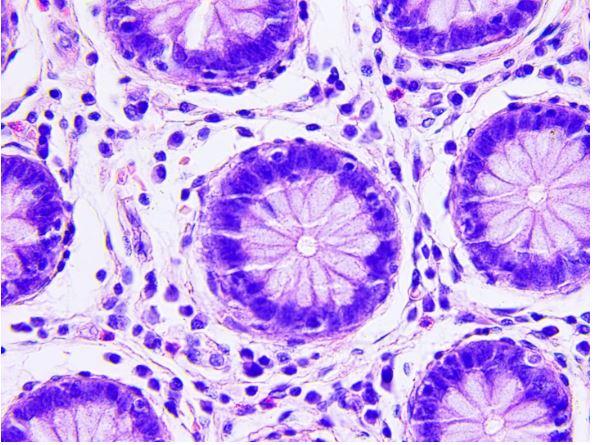Today, patients get the diagnosis of bowel cancer in the hospital without much differentiation in tumour subtypes. For years, Leuven bowel cancer researchers have been investing in finding different types of bowel cancer, in order to be able to align the treatment beter with the type of tumour. Up until now, researchers worldwide used a model that differentiated between 4 types of bowel cancer. Under the co-supervision of UZ Leuven, new research has now uncovered 2 new subtypes of classifying bowel tumours with the help of brand new single cell technology: 50% of the bowel tumours have, as expected, intestinal mucosa cells, but the other 50% display modified mucosa cells that look more like gastric mucosa cells. This information provides new insights for the unravelling of the origins of bowel cancer. "In a year's time making the diagnosis for bowel cancer will look radically different."
In a year's time, making the diagnosis of bowel cancer will look radically different. prof. dr. Sabine Tejpar
prof. dr. Sabine Tejpar
Whereas the existing classification looks at the tumour as a whole, with single cell technology, the researchers looked at each individual cell of the tumour. Based mucosa cells, the surface cell on our skin and mucosa, there appeared to be two completely different types of bowel cancer on cell level: a type of bowel cancer with the classic intestinal mucosa cells and another type of bowel cancer with mucosa cells that looked like mucosa from the stomach.
Prof. dr. Sabine Tejpar, bowel cancer researcher at UZ Leuven and KU Leuven: “I like to compare the process of tumour research with a smoothie: whereas, up to now, we have been mixing tumour tissue and look at the total mixture, single cell technology can look at each berry or raspberry separately. This has provided us with information that has called into question 30 years of insights in bowel cancer.”
Researchers suspect that inflammation is at the basis of a modification in the mucosa cell in that second group, a process called metaplasia in the medical world. The prognosis of the patients with a tumour from the second group is not as good: this type of bowel cancers displays a completely different growth pattern and different mutations than those in the first group. But because of their different characteristics, new research into treatments specifically for this type of bowel cancer can be initiated.
Hope for immunotherapy research
The new insights have important consequences for several domains. The pathologists, that analyse the bowel tumour in their lab, will now be able to identify the 2 subtypes with a new technique. Whereas single cell technology provided insights in the tumour, we now have to find out how these newly discovered subtypes can be included in the existing tumour research in hospitals and labs, without the use of very expensive single cell technology. To this end, a number of trials have been started, with the objective of adding the new classification to the existing diagnosis of bowel tumours in the course of 2023.
What's more, the discovery is also good hope for treatment of bowel cancer patients. In contrast with for example skin or breast cancer, there's hardly any immunotherapy with good results for bowel cancer. Immunotherapy is a treatment with medication that help the natural immune system recognise and destroy cancer cells. For only 10% of the bowel cancer patients immunotherapy is a possibility, more specifically for cancers with the MSI characteristic (microsatellite instability). Researchers found that all MSI bowel cancers had gastric mucosa cells and therefore belong to the recently discovered second subgroup. Now, new research will have to show whether the other 40% of bowel tumours from the second subgroup are susceptible to immunotherapy. This will require further research in collaboration with the pharmaceutical industry.

Prof. dr. Sabine Tejpar: “Goal is to create a complete map for the diagnosis of bowel cancer tumours: we visually project the insights gained from single cell technology unto the microscopic images of the tumour. This combined information will provide us with tens of new insights to help us unravel the origins of bowel cancer. In a year's time making a bowel cancer diagnosis will look radically different.”
Research was done in more than 60 patients of the National Cancer Centre Singapore, Singapore General Hospital, Samsung Cancer Centre Korea and UZ Leuven. After the publication, the trial will continue to run with new patients, and will also focus on other cell types. UZ Leuven and KU Leuven are investing in new research so that the results of this publication can be applied auickly in the hospital setting and provide a better diagnosis and treatment for patients. The trial was published in Nature Genetics.
